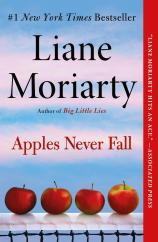Apples Never Fall
Review
Apples Never Fall
Bestselling author Liane Moriarty returns with APPLES NEVER FALL, a scandalous, page-turning novel about the secrets that threaten to tear apart even the most solid unions --- marriage, parenthood, siblinghood --- and whether or not any of us can ever really remember the past perfectly. Infused with the author’s trademark blend of tension and emotional insight, this book is as intelligent as it is compulsively readable.
The Delaneys are fixtures in their Sydney suburb. Joy and Stan are expert tennis players who used their talents to kickstart a famous tennis academy that not only trained professional players in their early years, but gave their community a place to turn to for sportsmanship, connection and family-friendly fun. Their four children, all former tennis stars, are now successful grownups, each with their own careers, relationships and memories of their childhood spent on the courts.
Now in their late 60s, Joy and Stan have sold their beloved academy and are struggling to adapt to their new roles as retirees. Joy, with her entrepreneurial spirit, has trouble winding down and instead immerses herself in educational podcasts so she can impress her children with her knowledge of their illnesses and careers. Stan, the archetypal sports coach, has turned to watching TV and monitoring the rise of his estranged star student, Harry Haddad.
"With perfectly rendered characters that anchor you to the more explosive, shocking portions of the plot, this is an utterly gripping thrill ride of reveals, betrayals and alliances that is as gobsmacking as it is emotional."
When we meet the Delaney siblings, we begin with free-spirited, possibly mentally ill Amy, who is perpetually between jobs, relationships and housing; non-confrontational, complacent Logan, who recently separated from his longtime girlfriend; pompous, wealthy Troy, who splits his time between New York City and Sydney; and physical therapist Brooke, the baby and apple of her father’s eye, the only one he deems a real success for her chosen career’s nearness to sports, though no one knows her marriage is on the brink of divorce.
The children have remained close throughout their adult years, but the reason for their most recent reunion is not a happy one: their mother has gone missing. Even stranger, their father seems unconcerned, even readily admitting that the two fought just before Joy disappeared. As they try to figure out where their mother is, they each recount the last year of their lives, a year fraught with tension, mysterious characters and hard-hitting recollections of their childhoods.
The chapters alternate between the present day and one year earlier, when a young stranger appears on Joy and Stan’s doorstep bloodied and bruised, claiming to have been abused by her boyfriend. The Delaneys have taught many children over the years, so the appearance of a random girl is not terribly unusual. But Savannah claims to have no idea who they are. With little else to occupy their time as retirees, they welcome her into their home, taking advantage of the feeling of a full house after so many years without their own children and no promise of grandchildren on the horizon (something Joy fixates on, though Stan seems ambivalent to the idea of becoming a grandparent). Though their children are initially wary of the battered girl, they eventually warm up to her. Yet one year later, she is completely gone from the picture. It seems impossible that there is no connection between Savannah and Joy vanishing into thin air.
Amy, Logan, Troy and Brooke each grapple with their father’s potential role in their mother’s disappearance. True, he is acting suspiciously, but he has never been violent, and their parents have always been visibly, happily in love. Or have they? Close in age but entirely different in spirit and countenance, each Delaney child seems to have their own idea of their mother, their father and their parents’ marriage. At the same time, they start to realize that while their parents could read their games with perfect accuracy, predicting every shot and planning for every weakness, Joy and Stan were often clueless about their feelings, blinded by a shared love of tennis and the Delaney family legacy on the court. As each child unpacks their own history, their siblings’ history and their father’s possible motive, the Delaneys divide into halves: two children certain that their father is innocent and two just uncertain enough to question everything they thought was true about their family.
What an absolute rollercoaster this book is! Liane Moriarty is a truly gifted writer, perhaps the keenest observer of the human condition writing today, and her ability to peel back the layers of the mostly stereotypical characters (the overachieving daughter, the pompous son, the hard-hearted coach) and find out exactly what makes them tick is unparalleled. The notion of using four adult children, all raised with strict guidelines for success, as protagonists becomes totally fresh in Moriarty’s hands, as each child is written clearly and vividly. Reading about Amy, Logan, Troy and Brooke (and their parents, of course) through one another’s eyes, we get a complete picture of each character, including, most importantly, the things they hide from one another and refuse to admit about themselves.
Exuberant, cleverly constructed and emotionally taut, APPLES NEVER FALL is a damning, eye-opening portrait of a family, as well as a reminder that growing pains are not limited to any age. With perfectly rendered characters that anchor you to the more explosive, shocking portions of the plot, this is an utterly gripping thrill ride of reveals, betrayals and alliances that is as gobsmacking as it is emotional. Adapting any of Moriarty’s novels for the screen seems like an obvious choice, but if anyone in Hollywood is reading this review, believe me, this one needs to be next.
Reviewed by Rebecca Munro on September 24, 2021
Apples Never Fall
- Publication Date: July 19, 2022
- Genres: Fiction, Mystery, Psychological Suspense, Psychological Thriller, Suspense, Thriller, Women's Fiction
- Paperback: 480 pages
- Publisher: Holt Paperbacks
- ISBN-10: 1250220270
- ISBN-13: 9781250220271




